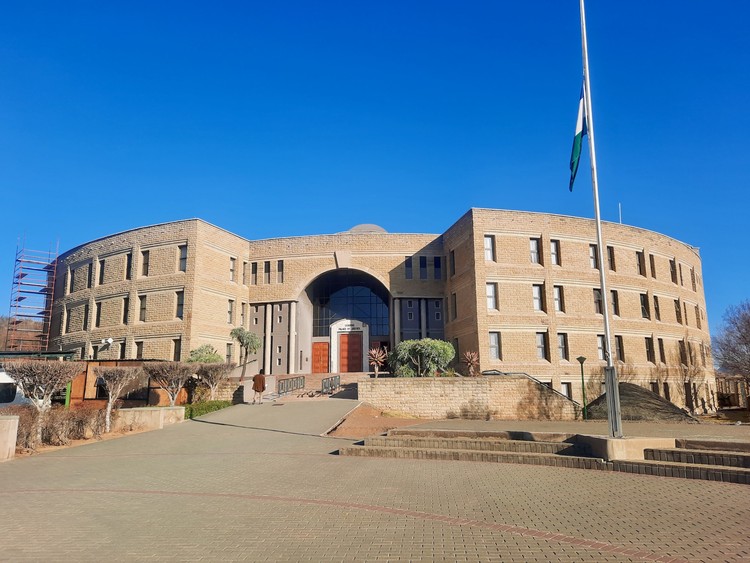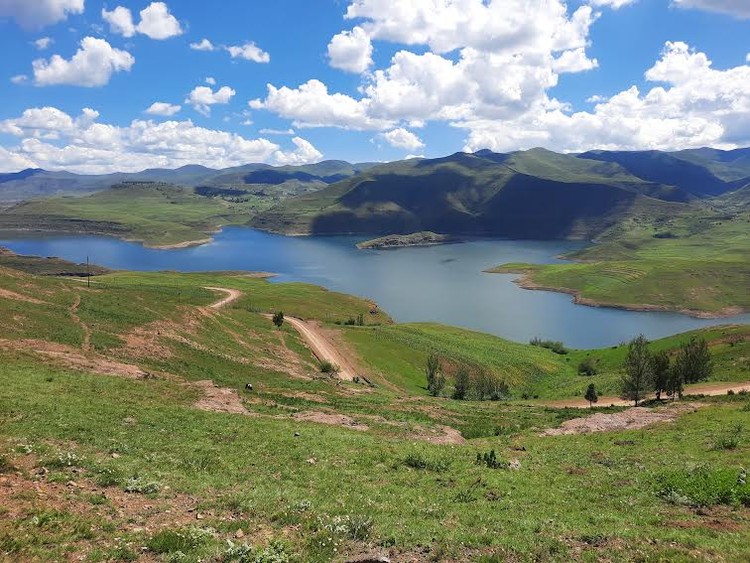The human cost of SA’s water lifeline: Lesotho communities go to court
Thousands of people and hundreds of businesses are taking the Lesotho Highlands Development Authority to court over the Katse and other dam projects
A constitutional court case brought by communities affected by the Lesotho Highlands Water Project is to be heard by the Lesotho High Court. Photo: Sechaba Mokhethi
- Communities affected by the Lesotho Highlands Water Project have brought a constitutional court case arguing that they were denied fair compensation for decades.
- More than 3,000 people and 889 businesses are suing the Lesotho Highlands Development Authority over the dams project, claiming decades of unpaid or inadequate compensation for land taken since the 1980s.
- Some families allegedly received as little as 78 cents per square metre for their land, with properties expropriated years before compensation was even calculated.
- The applicants allege that community members who resisted were subjected to arrest, detention and torture, and that a promised community development fund was never established.
The Katse Dam, the largest in the Lesotho Highlands Water Project (LHWP) and a key water source for the Vaal Dam, which provides all Johannesburg’s drinking water, is at the centre of a constitutional case to be heard by the Lesotho High Court.
While hailed as a major African infrastructure success, the dam project has come at a high cost to communities, according to the applicants. More than 3,000 individuals and 889 registered businesses have now brought a case against the Lesotho Highlands Development Authority (LHDA) – tasked with implementing the LHWP – and its contractors.
In court papers, the applicants allege a series of injustices — including unpaid compensation, human rights violations, broken promises, and the failure to establish a promised community development fund
The LHWP arose from a 1986 treaty to transfer water from Lesotho to South Africa, while providing hydroelectric power and broader development opportunities, such as irrigation and tourism for Lesotho.
Under Article 7 of the treaty, the LHDA was mandated not only to construct the project but also to safeguard the welfare of communities directly impacted by it.
But the applicants claim that the implementation of Katse Dam, Mohale Dam, and the ongoing Polihali Dam has violated the Constitution of Lesotho.
At the core of their case is the allegation that the LHDA failed to promptly and fully compensate affected communities and infringed on their land and property rights.
In a founding affidavit, Limpho Natsoane, chairperson of the Mokhotlong Business Forum Development Trust (the lead applicant), says the LHDA failed to meet its constitutional duty to promptly and fully compensate communities after acquiring their land.
The applicants also allege that the LHDA never established the long-promised community development fund, and that the compensation provided does not account for the irreplaceable loss of communal resources.
They are asking the court to declare all phases of the LHWP unconstitutional, to the extent that they violated constitutional and statutory rights. The legal challenge cites breaches of the Lesotho Constitution, the Human Rights Act of 1983, the Land Act, the LHDA Order of 1986, and other laws.
According to Natsoane’s affidavit, the LHDA did not ensure that the community members’ standard of living did not decrease after construction on the project began.
The losses, dating back to 1987, include communal grazing land, medicinal plants, wild vegetables, brushwood, and grasses — vital resources for survival in rural Lesotho.
The consequences, they state, are dire: communities remain impoverished, their cattle are dying due to a critical lack of pastureland, and their overall standards of living are deteriorating.
“This has left the applicants and others under the most desperate conditions,” Natsoane said. “They have no grazing land, no money to buy fuel for their livelihood, and no other basics after their relocation.”
Legal filings describe procedural irregularities and significant delays. Some properties were allegedly expropriated as early as the 1980s for the construction of Katse and Mohale dams.
Yet, “compensation rates were only approved from 1997,” Natsoane said. “But our properties were taken in 1986 and 1987.”
Formal compensation regulations only came into effect much later, with the LHDA Compensation Policy 2016 and LHDA Compensation Regulations 2017.
The Katse Dam, the largest in the Lesotho Highlands Water Project and a key water source for the Vaal Dam, which provides all Johannesburg’s drinking water, is at the centre of a landmark constitutional case to be heard by the Lesotho High Court. Archive photo: Sechaba Mokhethi
Applicants also argue that Phase II construction began in March 2015, but legal publication of the approved scheme came only later that year. They argue that the LHDA proceeded with construction without fully complying with compensation protocols and legal approvals.
Phase II centers on the construction of the Polihali Dam in the Mokhotlong District, along with a 38km gravity tunnel linking the new Polihali reservoir to the existing Katse reservoir. It is being developed to increase Lesotho’s hydropower capacity and boost water exports to South Africa’s Vaal River system.
The plaintiffs claim that even where compensation was offered, it fell far below lawful or market standards. For instance, applicant Maoetsi Tekane’s late husband reportedly received just M16 (R16) annually for 21m2 of land. Lebohang Lengoasa allegedly received about M3,130 for about 4,000m2 in 2020. In both cases, the compensation equated to 78 cents per square metre.
According to Natsoane, “The compensation form does not even indicate that any interest was calculated from 2012 or 2014 when the project commenced.”
They contend that for over 37 years, land was subjected to expropriation without fair compensation, breaching LHDA’s own policies and the law.
One of the most serious allegations is that community members who resisted or raised concerns were subjected to state violence. The applicants are asking the court to declare that the arrest, detention, torture, and prosecution of some individuals — allegedly by police acting with LHDA agents — were unconstitutional.
The lead applicant, the Mokhotlong Business Forum Development Trust, represents over 489 registered companies. Another 400 affected businesses are part of other associations, such as the Batlokoa Road Transport and Suppliers Association.
The second applicant, the Community Resources Development Trust, comprises more than 3,000 individuals, including farmers, women, clergy, traditional leaders, and youth.
The applicants are not only seeking overdue compensation and the establishment of a development fund, but also a share of contract percentages from Phase II contractor payments.
They argue that the case is urgent, as many contractors have already left their project sites without fulfilling their community obligations.
“They left us destitute,” Notsoane said.
“This case could benefit over 100,000 people,” says advocate Lerato Rabatho, Development Manager at Seinoli Legal Centre, the NGO facilitating the litigation.
On Friday, attorney Monaheng Rasekoai for the LHDA said he filed the LHDA opposing papers on Thursday and promised to share them with GroundUp. We will report on the matter next week.
Support independent journalism
Donate using Payfast

Don't miss out on the latest news
We respect your privacy, and promise we won't spam you.
© 2025 GroundUp. This article is licensed under a Creative Commons Attribution-NoDerivatives 4.0 International License.
You may republish this article, so long as you credit the authors and GroundUp, and do not change the text. Please include a link back to the original article.
We put an invisible pixel in the article so that we can count traffic to republishers. All analytics tools are solely on our servers. We do not give our logs to any third party. Logs are deleted after two weeks. We do not use any IP address identifying information except to count regional traffic. We are solely interested in counting hits, not tracking users. If you republish, please do not delete the invisible pixel.


